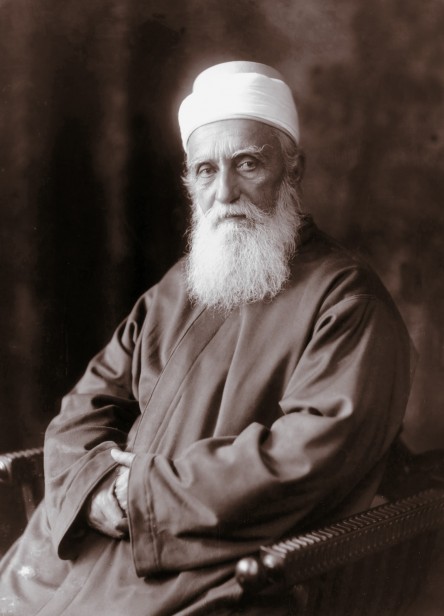Summary: A hundred years have passed since the arrival of ‘Abdu’l-Bahá in Egypt on His way to the western hemisphere. Before continuing His journey, He was obliged for health reasons to stop for a few months in Egypt, during which time He illumined the political and intellectual leadership, and changed their suspicious attitude to a friendly one. His visit was welcomed by the government of Egypt and its leaders. On the occasion of the centenary of this historic event, we are highlighting its importance and summarizing some of its spiritual effects, which still radiate light and energy upon the horizons of the world.

'Abdu'l-Bahá (Reproduced with permission of the Bahá'í International Community)
Destiny determined that Alexandria become a home for ‘Abdu’l-Bahá and a stopover for His comings and goings during His travels in western countries over a period of three years. During those inter- vals, He regained His strength and bestowed on the people and thinkers of Egypt His wisdom, whose present burgeoning is re- viving our hope, and ach- ieving the realization of God’s promise to change the earth. We recall now, on this first centenary of that historic event, some of the abundant bounties of those days.
‘Abdu’l-Bahá (known in the literature of Egypt as ‘Abbás Effendi) received a warm welcome and exp- ressions of appreciation from the Egyptian gov- ernment and population, when upon His arrival He was able to dispel the misconceptions and doubts that a vicious consul of Iran had disseminated in government circles and a- mong Muslim scholars to tarnish the good name of the Bahá’í Faith and suppress its truth. During His stay, He gave bountifully to all of that boundless knowledge, magnanimity and love, of which He was unique bearer, and which He would carry, during the course of His journey, as far as the Pacific coast. It was a gift immeasurably great and far-reaching, wrapped in outward events—the doors now humbly opening our perception.
In 1910, on the 19th of September, the Egyptian newspaper Al-Ahram published news of the unannounced visit to their country of the “leader of the Babi Faith”. The news article stated: “Abbas Effendi left his residence in the city of ‘Akká a few days ago for Port-Said, an event that has precipitated his Persian followers residing in Egypt to hasten to that city to be blessed by visiting him. This surprise visit has given rise to speculation and controversial claims between his opponents and supporters about its motive. The former have alleged he left ‘Akká out of fear of what may come upon him from the new constitutional Turkish regime. ‘His followers, strongly deny these uncorroborated allegations. In fact, he came to Egypt for health reasons because the air of Egypt is indicated as a cure for his asthmatic attacks caused by his long incarceration.’” The paper’s editor hoped that the days to come would bring out the true reasons for this unexpected move.
In those days, neither the truth of the “Babí movement” nor of “Abbas Effendi”, Who is also named ‘Abdu’l-Bahá—meaning the servant of the Ancient Beauty, were known to the Egyptian layman. In all likelihood, this news item was a mere reminder for the readers of the calumnious accusations they had heard made against the Bahá’í Faith, hearsay they would then quickly forget as they returned to their preoccupations. There were in fact many other subjects occupying the mind of ordinary Egyptians. “The gift of the Nile” was at that time the theatre of opposite policies and clashing political movements.
On one side, Britain was actively pursuing its plans to establish stronger control over the country’s affairs. On the other, a growing national consciousness nourished the Egyptian desire to acquire complete freedom. An ideological struggle was growing up between those who believed in following the western pattern of development to ensure a better future for Egypt and those who wanted help from the staggering Sultanate of Turkey to realize a “Muslim Union”, as acclaimed by Jamálu’d-Dín-i-Afghání. For their part, the Egyptian Christian Copts were hoping that the appointment of Butrus Ghálí Bashá as prime minister would end the discriminatory policy in appointments to public office, hopes dashed when his assassination, which came on the heels of accusations that he had betrayed Egypt, rekindled religious strife and hate just a few months before ‘Abdu’l-Bahá’s visit to Egypt.
NEXT ARTICLE: The Significance of ‘Abdu’l-Bahá’s Journey to the West
DATE: First week of September, 2010
In this tumultuous atmosphere and religious unrest, ‘Abdu’l-Bahá’s visit to that land came as a salubrious breeze and healing remedy. His talks about the coming of a new world comforted the people by affirming that the crises that now surrounded them were but the lingering shackles of an old world, which is being superseded by a new day—that will end political strife and sectarian conflict, a day which He is now promulgating and gathering supporters for from every corner of the world. Those who today read the article published in Al-Ahram on September 19th, 1910, or the memories of the meeting with ‘Abdu’l-Bahá recounted by ‘Abbás Mahmúd Al-‘Aqqad and published in the January 1930 issue of Al-Hilál will see the importance ‘Abdu’l-Bahá gave to the matter of unity among people, which He considered necessary for people’s happiness and peace.
